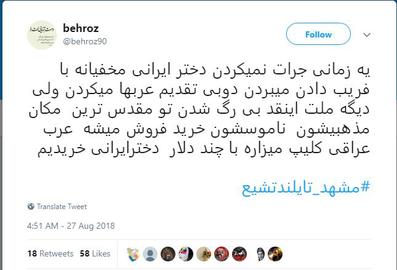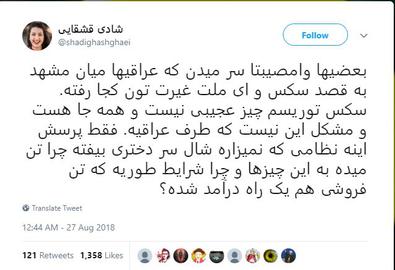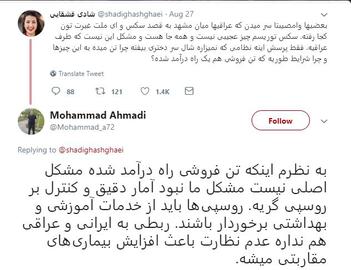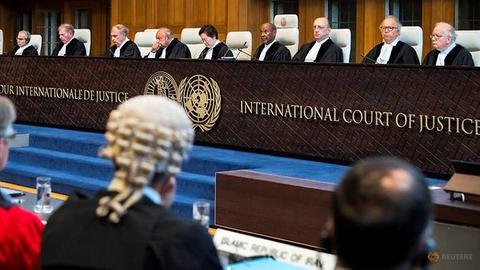“Was it not enough that we gave them electricity and water for free?...Now you are selling our honor?
“People have become so morally lax that they sell their honor in their most sacred religious site.”
“Sex tourism is not something strange and exists everywhere.”
“Prostitutes must be provided with educational and health services...otherwise it means the spread of sexually transmitted diseases
Mashhad, the second most populous city and the holiest Shia site in Iran, is visited every year by millions and millions of Iranian and foreign pilgrims and other tourists.
Millions of Iranian and foreign pilgrims and other tourists visit Mashhad, the second most populous city and the holiest Shia site in Iran, every year. But recent revelations that the city has turned into a popular destination for Iraqi sex tourists have shocked Iranians, and many of them have turned to social media to vent their horror and disgust.
And yet, it’s not really news. “Many of the managers of [hotels] confirm that a common question from Iraqi visitors is where to find sex workers,” an article entitled “Prayer, food, sex and water parks in Iran's holy city of Mashhad” published in The Guardian in May 2015 reported. And yet, since then, there have been new developments. From the beginning of 2018, and following President Trump’s announcement to withdraw from the nuclear agreement and reimpose sanctions on the Islamic Republic, both the value of the Iranian currency and the number of European tourists have fallen. At the same time, the number of Iraqi visitors to Iran has increased by 90 percent.
This increase has helped the economy in some Iranian cities to a degree, but in the two provinces of Khuzestan and Razavi Khorasan — of which Mashhad is the capital — it has given rise to scandals and controversies linked to the sex trade.
During the third week of August 2018, the website Khabar Online, a news site closely linked to conservatives, published a report about the underground sex market, claiming that at least 6,000 “guesthouses” in Mashhad were actively involved in the trade. It reported that single Iraqi men are a fixture in the guesthouses, renting out rooms on the condition that they will receive sexual services. The site also demanded that the authorities put a stop to it.
The Khabar story attracted widespread response, prompting the newspaper Shahrvand to approach Mohammad Ghanei, the president of Razavi Khorasan’s Association of Hotel Owners, and question him about this underground market. Ghaemi did not deny that such a market existed but urged hotels to be “more careful.” He pointed out that hotels in Iran, and especially those in Mashhad, are prohibited from accepting couples who are not “legally married” and it was this this law that had boosted the market for “temporary marriages” (concubinage).
1,300 “Free Agent” Hostels
There are reports that the number of hostels and guest houses in Mashhad has exceeded 7,300. But it is not known how many of them are involved in the sex market. Officials say that only 6,000 hostels in Mashhad have been registered with the relevant authority and so supervised by the police. This leaves 1,300 hotels operating outside the supervision of the police and other government agencies, and about which these authorities know nothing.
In his interview with Shahrvand newspaper, Ghaemi did not offer any statistics, but he did emphasize that such places are breaking the law by accepting Iraqi men and their “companions.” His controversial comments attracted further media attention, and a day later, in an interview with Mehr News Agency, he retracted them [Persian link]. “I never confirmed the reports that Iranian women in Mashhad are sexually exploited,” he told the news agency. “Therefore, I am totally denying this interpretation [of my words] and the quotations attributed to me.”
Despite Ghaemi’s denial, Ebrahim Pourfaraj, president of the Iranian Tour Operators Association, contradicted him [Persian link], albeit in “clean” language. “Among Iraqi tourists there some who come to Iran to have certain relations,” he said. “One of the cities named is Mashhad, but now they are talking about Abadan [in Khuzestan] as well.”
The Alternative of “Temporary Marriage”
The market for sexual services in Iran’s pilgrimage cities goes way back, but after the 1979 Islamic Revolution, when sexual relations outside of marriage became illegal, “temporary marriages” emerged as a popular alternative way to buy and sell sexual services. Sunni religious authorities consider it un-Islamic, but the majority of Iraqis are Shias.
But if there has been an active sex trade in many religious Iranian cities for decades, including Qom, Mashhad and Isfahan, then why the sudden sensitivity to Iraqi men taking part in it?
Besides the increasing controversy over concubinage and demands for women’s rights in the region and around the world, there is also an important element of the historic animosity that many Iranians feel toward Arabs. As part of this, many Iranians feel ashamed and humiliated that Arabs are allowed to pay Iranian women for sexual services.
“They come looking for prostitutes,” Mehdi, a taxi driver, told the Guardian reporter. “One day I picked up an Iraqi guy and he asked me if there were any [concubines] around... We deserve all we get for letting those Arabs into our country. We have so little honor and pride left that even Arabs are showing up in this most holy city asking around for women. That bastard I just told you about? He actually knew some Persian. So as soon as he asked about [concubines], I let loose every vile curse I ever heard, pulled over, grabbed him by his collar, and tossed him out of my cab. And as I drove off I yelled, ‘Eat shit!’ — just for good measure.”
Online, some Iranians are using the hashtag #MashhadIran’sThailand to comment on Mashhad’s sex market. And some blame Islamic Republic officials for the growth of the industry. Iran is becoming poorer, they say, and destitute women are forced to sell their bodies.
The Twitter Battlefield
But not everyone on social media had the same take on the issue. In fact, posts reflected a wide variety of points of view. [All linked tweets are in Persian.]
“Why are we so indifferent?” tweeted Amir Hosseini. “Was it not enough that we sold them our seas? Was it not enough that we gave them electricity and water for free? Was it not enough that you imprison this country’s youth? Now you are selling our honor? So pitiful? Isn’t it enough?”
“There was a time when they were not so daring,” tweeted Behrouz. “They would deceive young Iranian girls and secretly take them to Dubai to offer them to Arabs. But now people have become so morally lax that they sell their honor in their most sacred religious site.”
“After eight years of war it is only now that we have noticed that the Iraqi brothers have taken control of Mashhad,” tweeted Ahmad Dabir. “But they take only women as their prisoners of war. Woe on men of Mashhad who so gallantly defend their sisters.”
It Doesn't Happen Here
There were also tweets from firm supporters of the Islamic Republic, who denied that such a thing as a sex market existed in Mashhad. “Around 3.6 million Arab pilgrims come to Mashhad and most of them are accompanied by their families,” tweeted Mohammad Saeed Ahadian, the managing editor of the newspaper Khorasan, published in Mashhad. “Even if one percent of them were involved in sexual relations, it would have been so obvious that there would have been no need to find evidence for it. This happens rarely and it is a dirty slander.”
“Each country must invest in its advantages to increase its income from tourism,” tweeted Hossein Kazeruni, a cleric. “Now Iran’s strong point is Mashhad and pilgrimage. We must use this advantage and seek to increase tourism instead of rumor-mongering and destroying this strategic industry and the important relations between Shias and Iran.”
“Those who today shed crocodile tears for the rumor about ‘sexual exploitation of Iranian women by the Iraqis’ are the same ones who prescribed freedom of dress to boost tourism,” tweeted Abdoljavad Kanani. “They had no honor then and they have no honor now.”
And yet others argued that the sex trade is an unavoidable part of life around the globe. “There are some who shout ‘catastrophe’ because Iraqis are in Mashhad to have sex,” tweeted Shadi Ghashghaei. “Sex tourism is not something strange and it exists everywhere.”
“The main problem is not that prostitution has become a way to have an income,” wrote Mohammad Ahmadi. “The problem is that we have no accurate information about prostitution and no supervision over it. Prostitutes must be provided with education and health services. It has nothing to do with being Iranian or Iraqi. No supervision means the spread of sexually transmitted diseases.”
And the debate goes on. At the time of writing, the topic continues to gather momentum on social media, with people from all walks of life and with conflicting opinions making their voices heard.
More on Iranian sex workers:
Is Tbilisi the New Capital for Iranian Sex Workers?, August 7, 2018
Iran’s Failure to Combat Prostitution, February 27, 2018
Iranian Pimps and Police, A Complicated Relationship, September 28, 2017
Desperate Iranian Sex Workers in Dubai Want to Return Home, Part 2, September 25, 2017
Desperate Iranian Sex Workers in Dubai Want to Return Home, September 19, 2017
“Concubines,” “Prostitutes,” and "The Powerful,” February 20, 2015
Girls as Young as 12 Turn to Prostitution, November 6, 2015
Iranian Women and Dubai’s Sex Market, June 16, 2014
Trading Sex on Facebook, Iranian Style, September 21, 2014
visit the accountability section
In this section of Iran Wire, you can contact the officials and launch your campaign for various problems




























comments